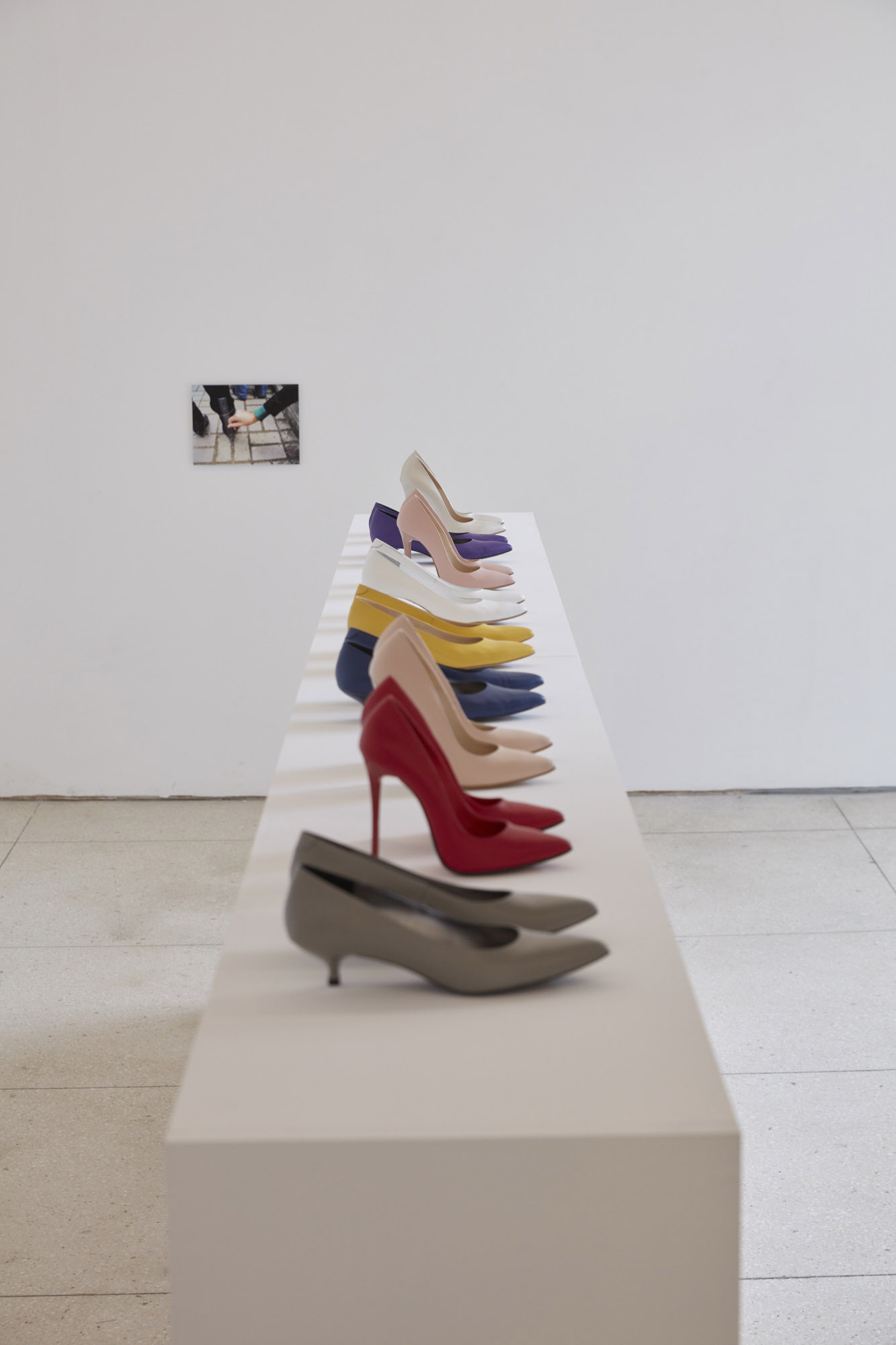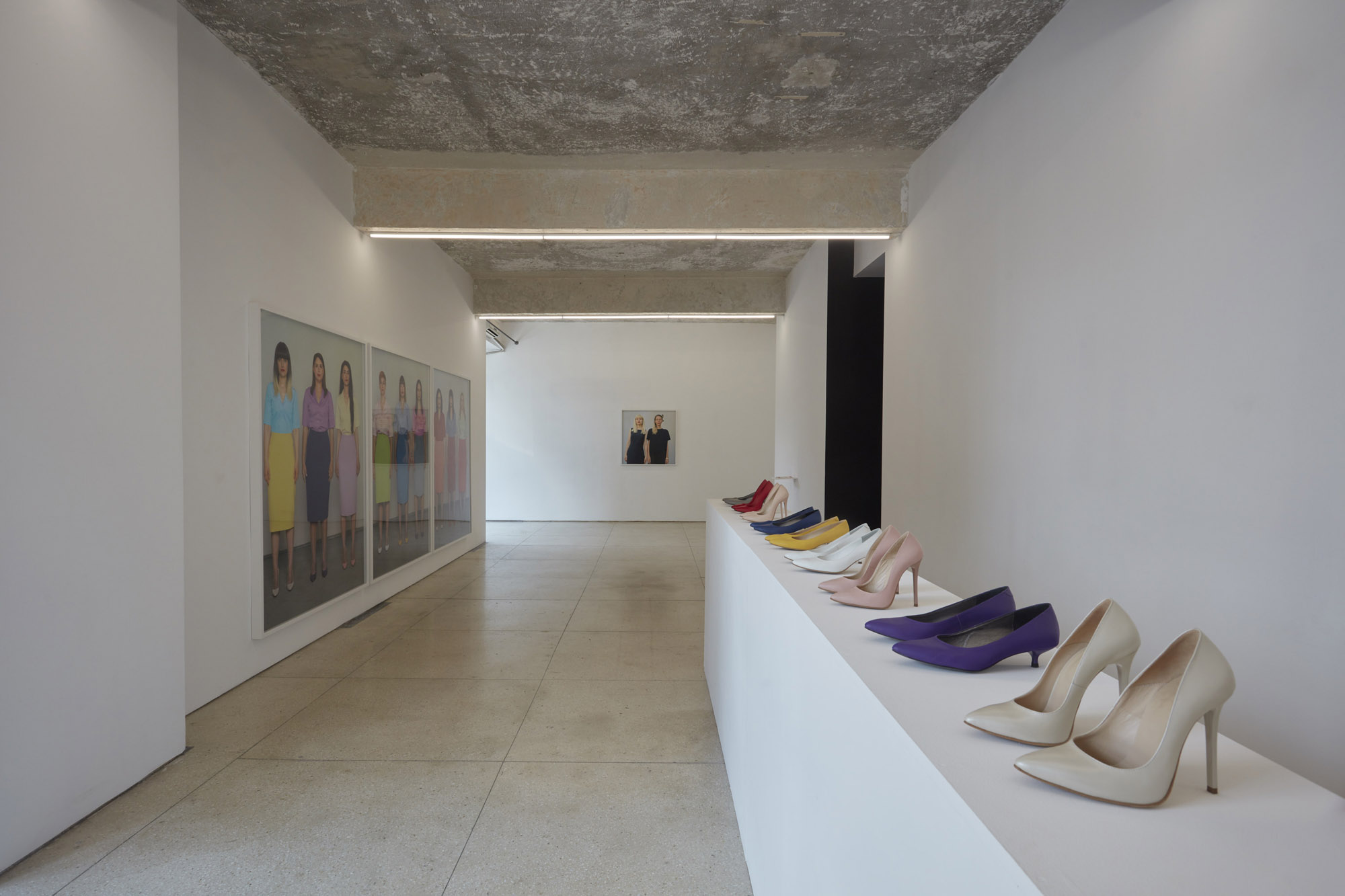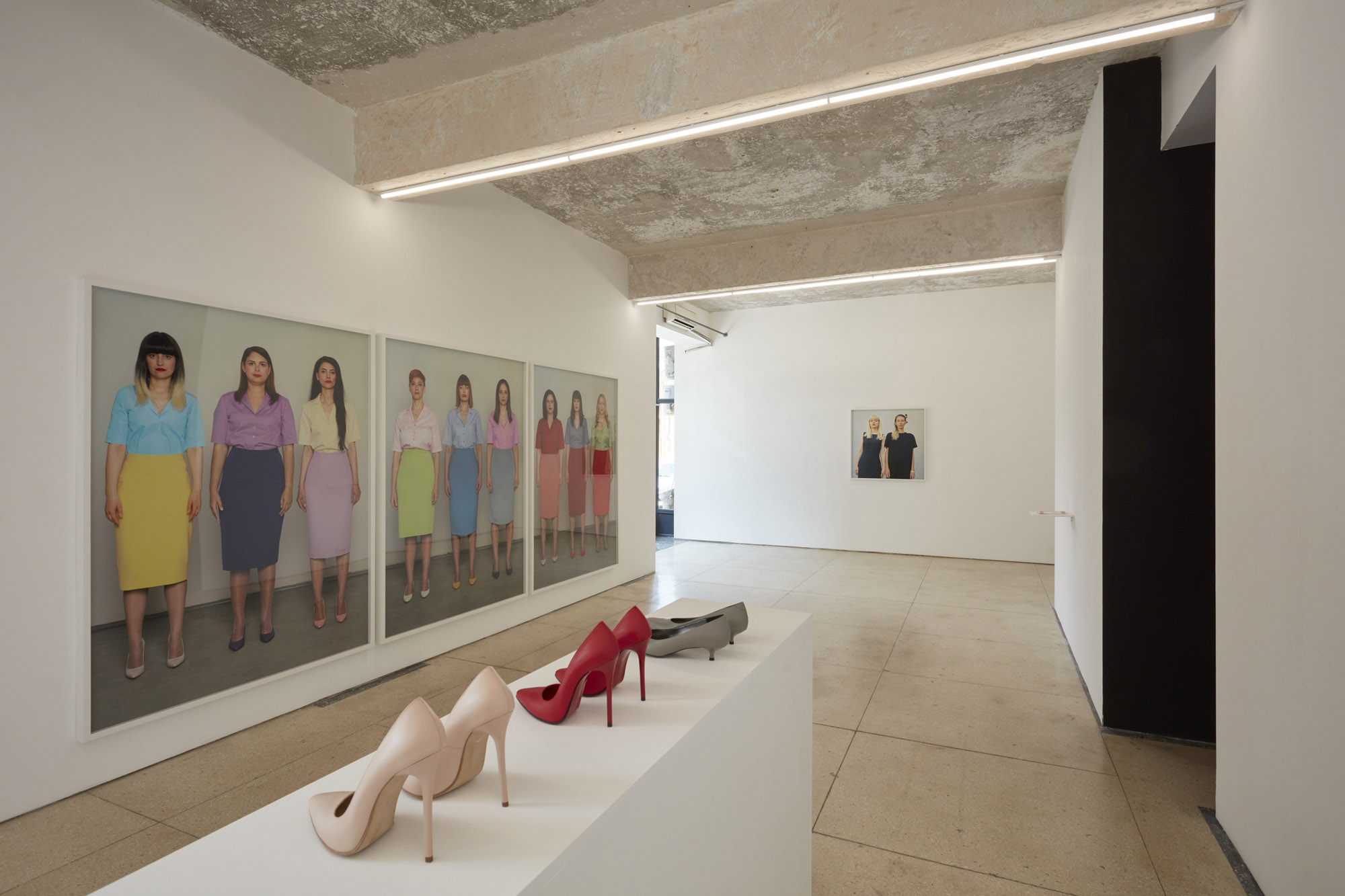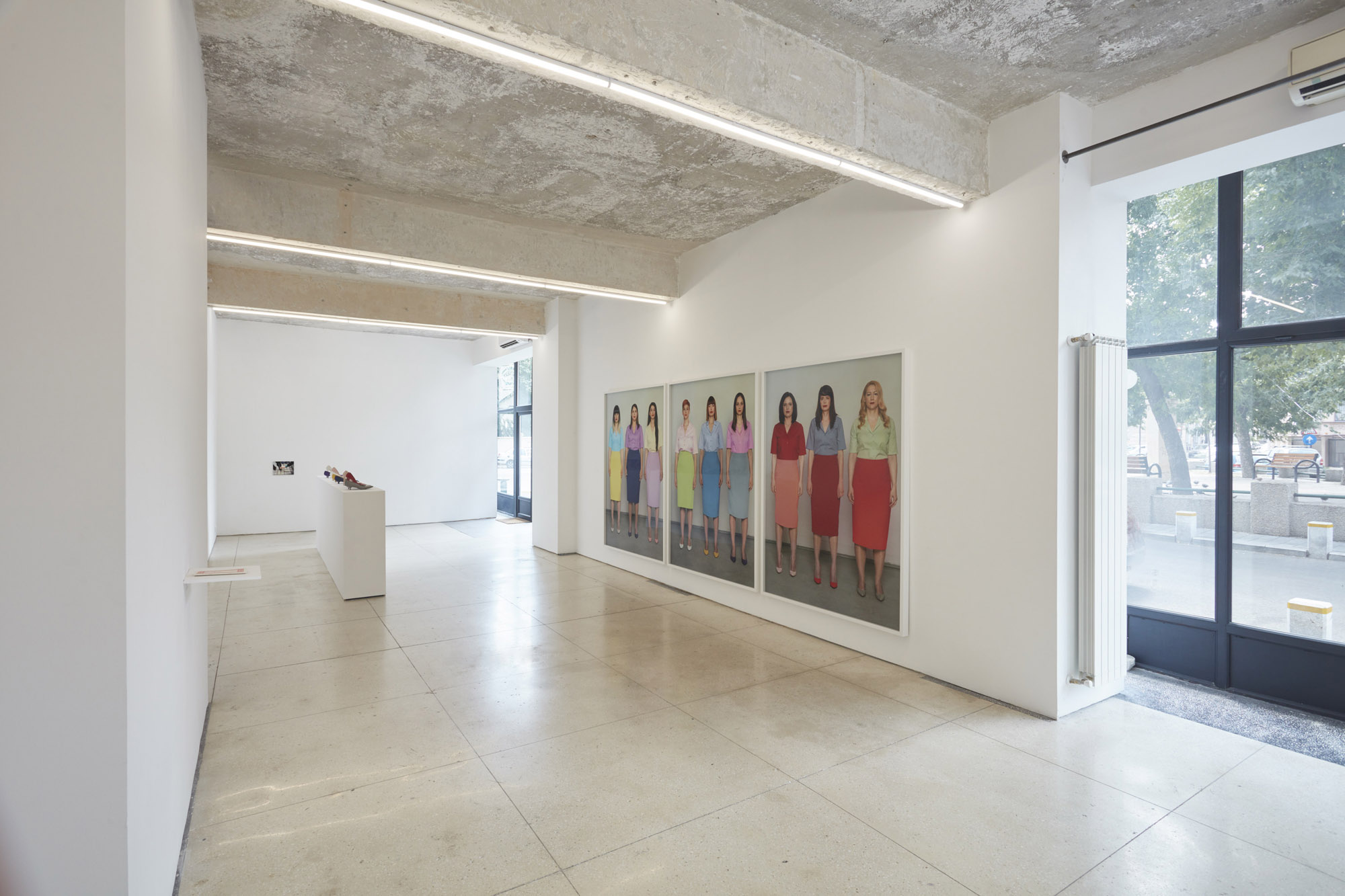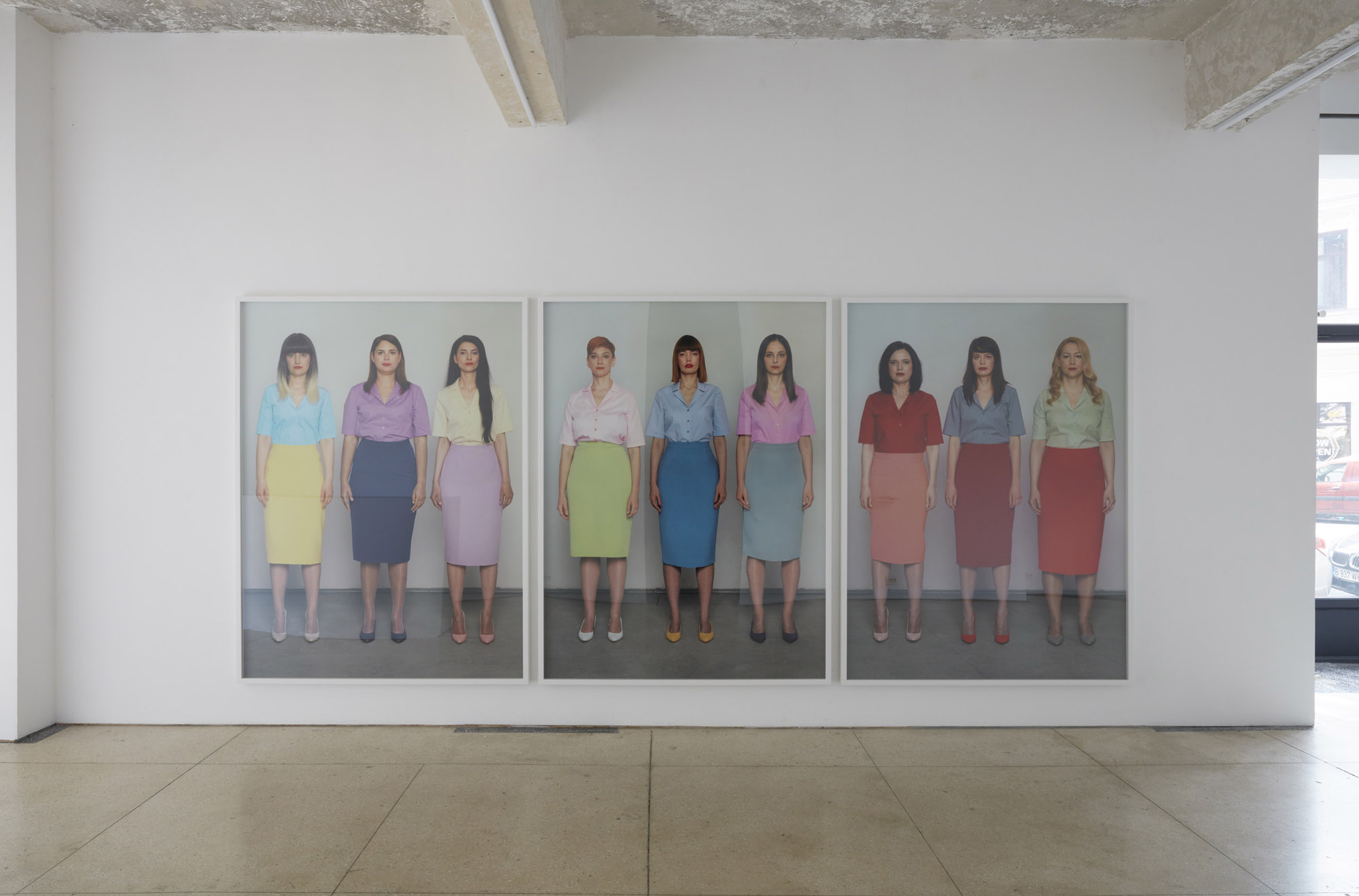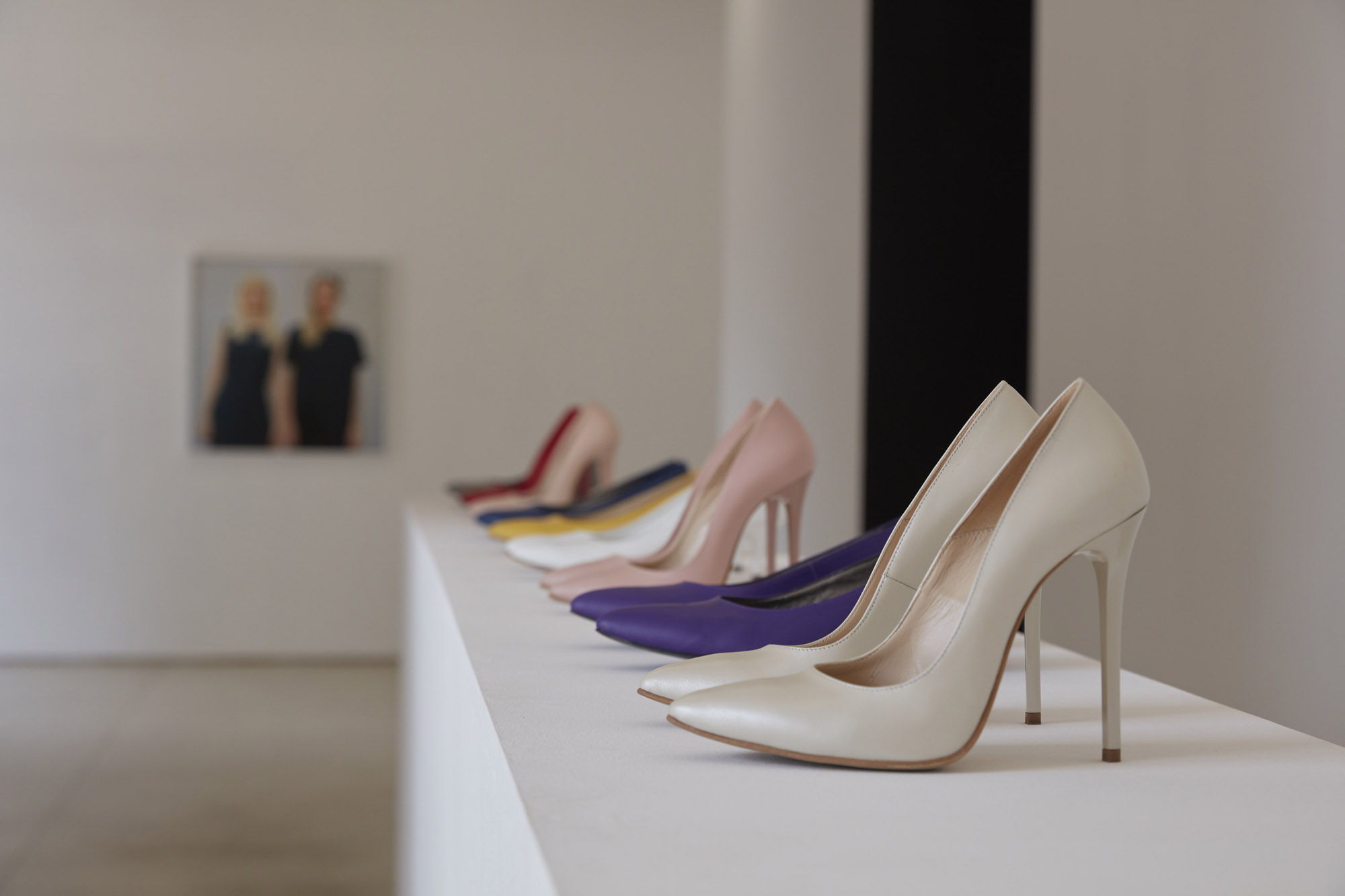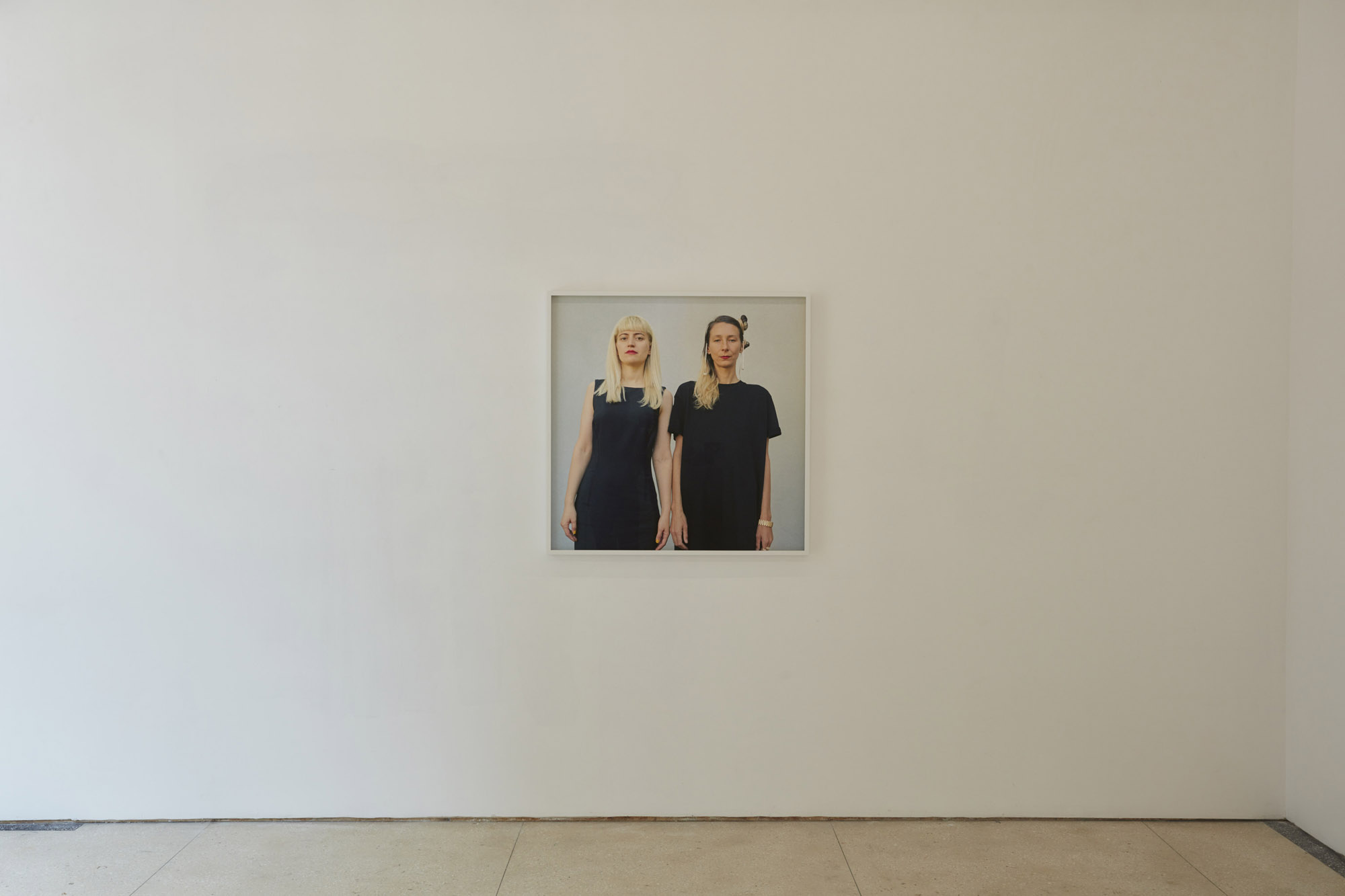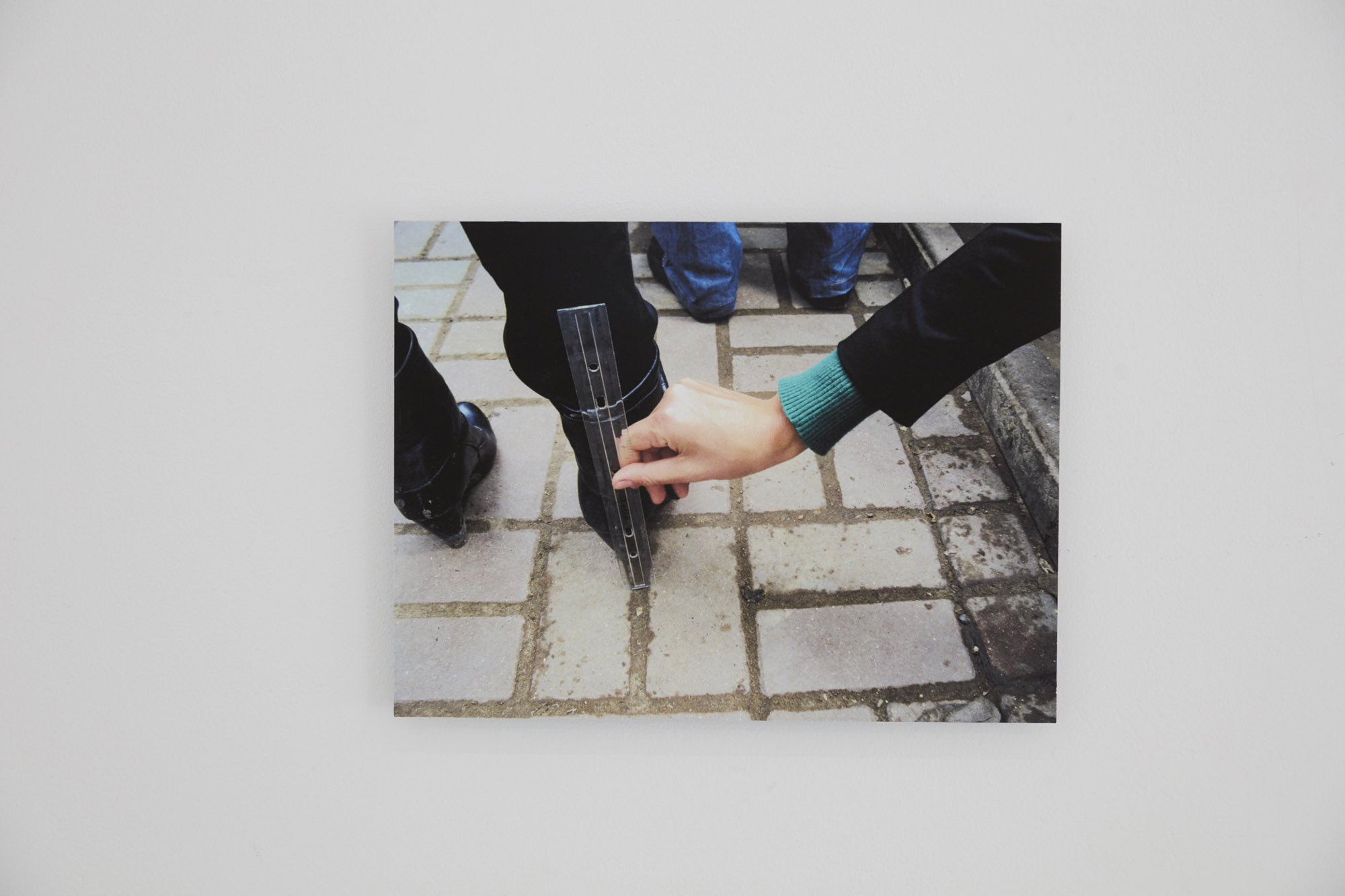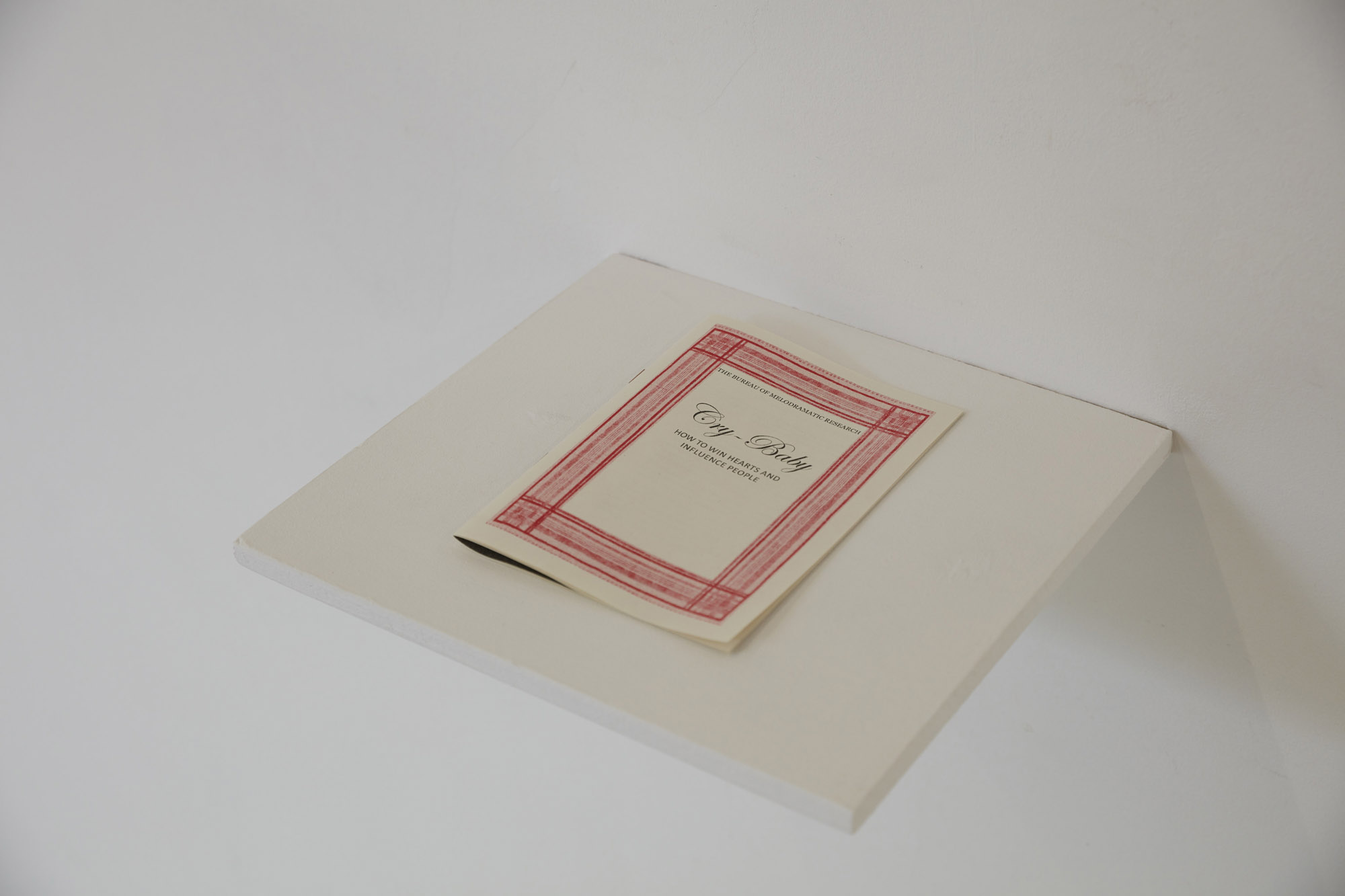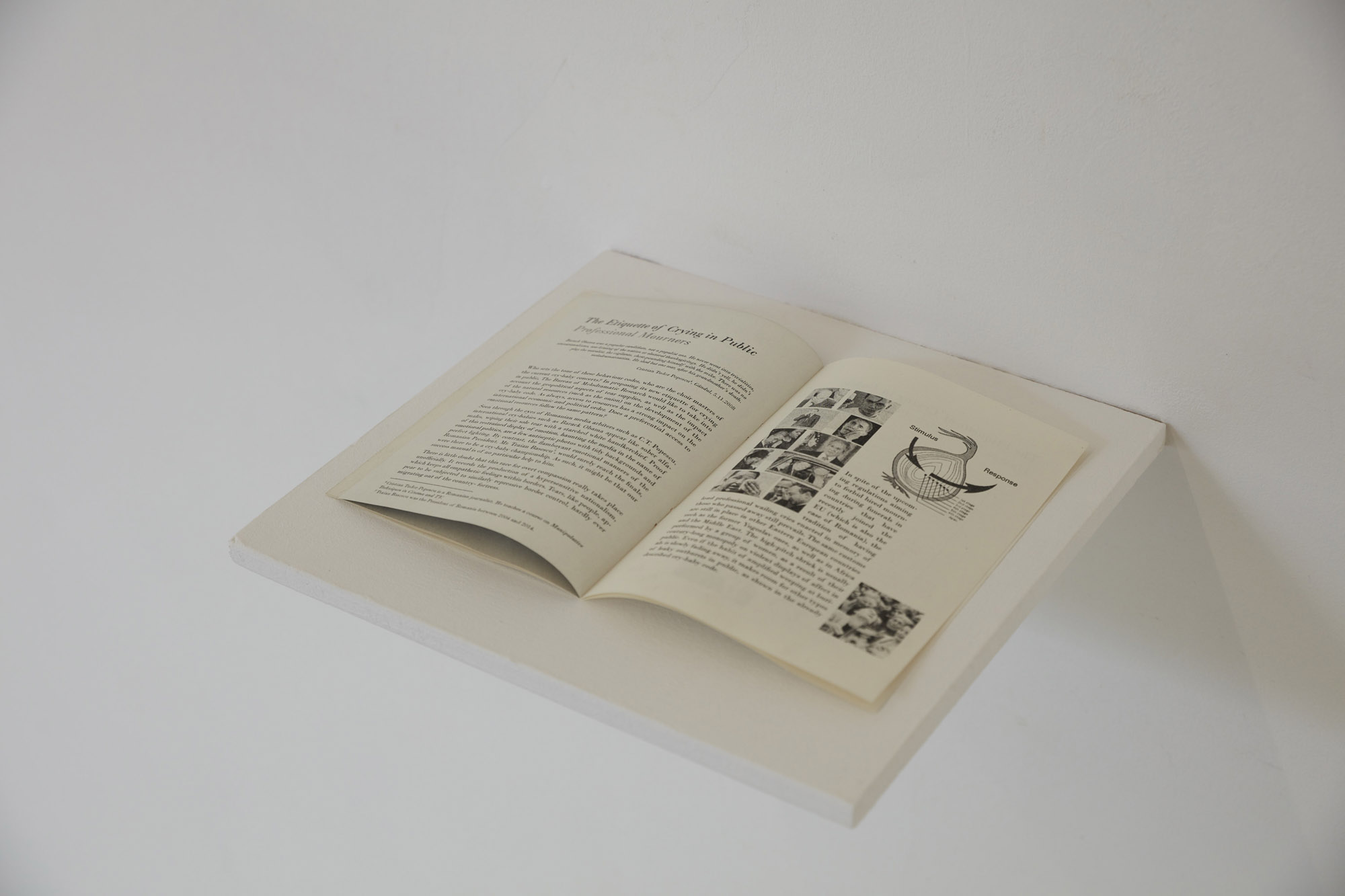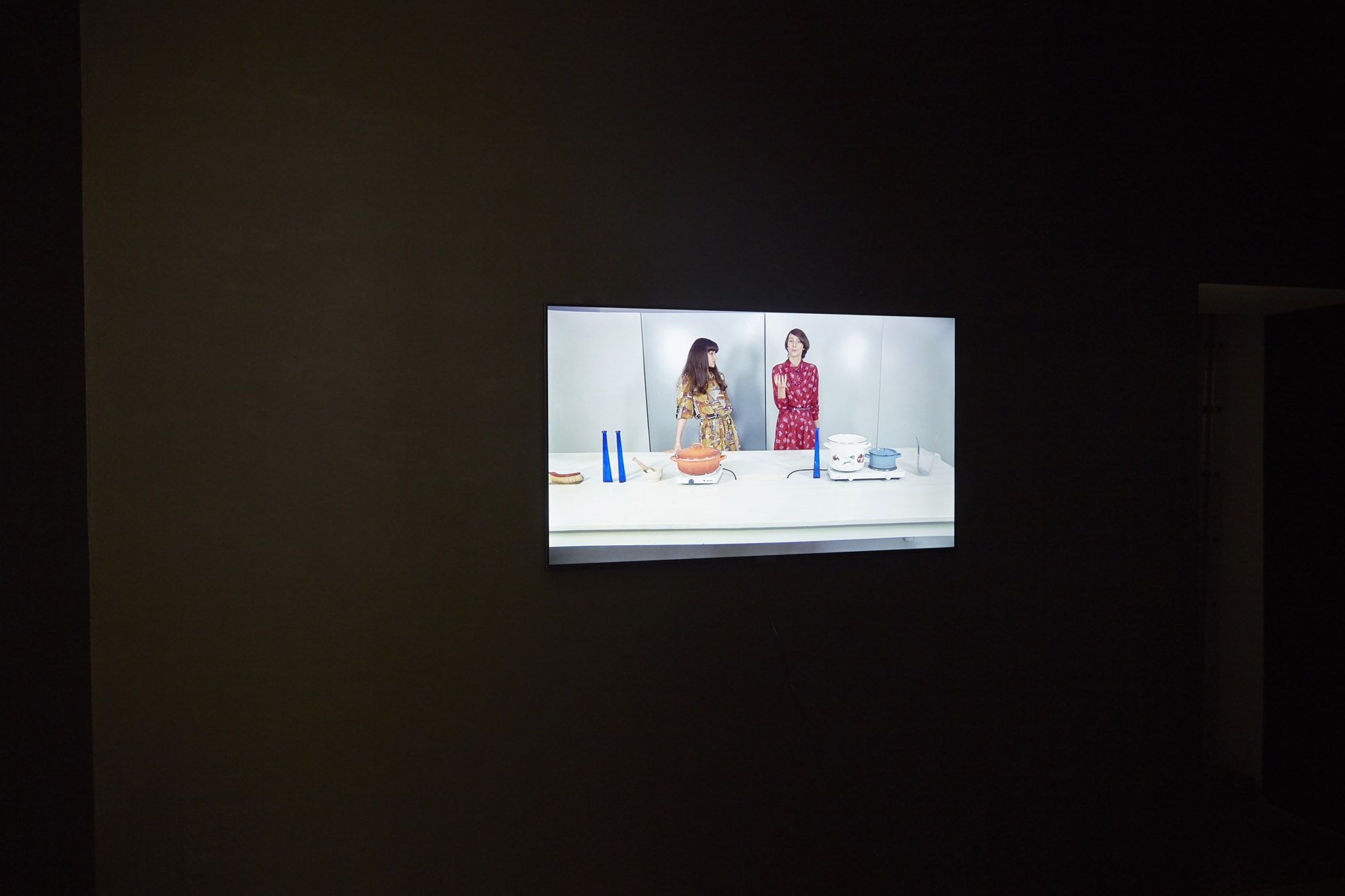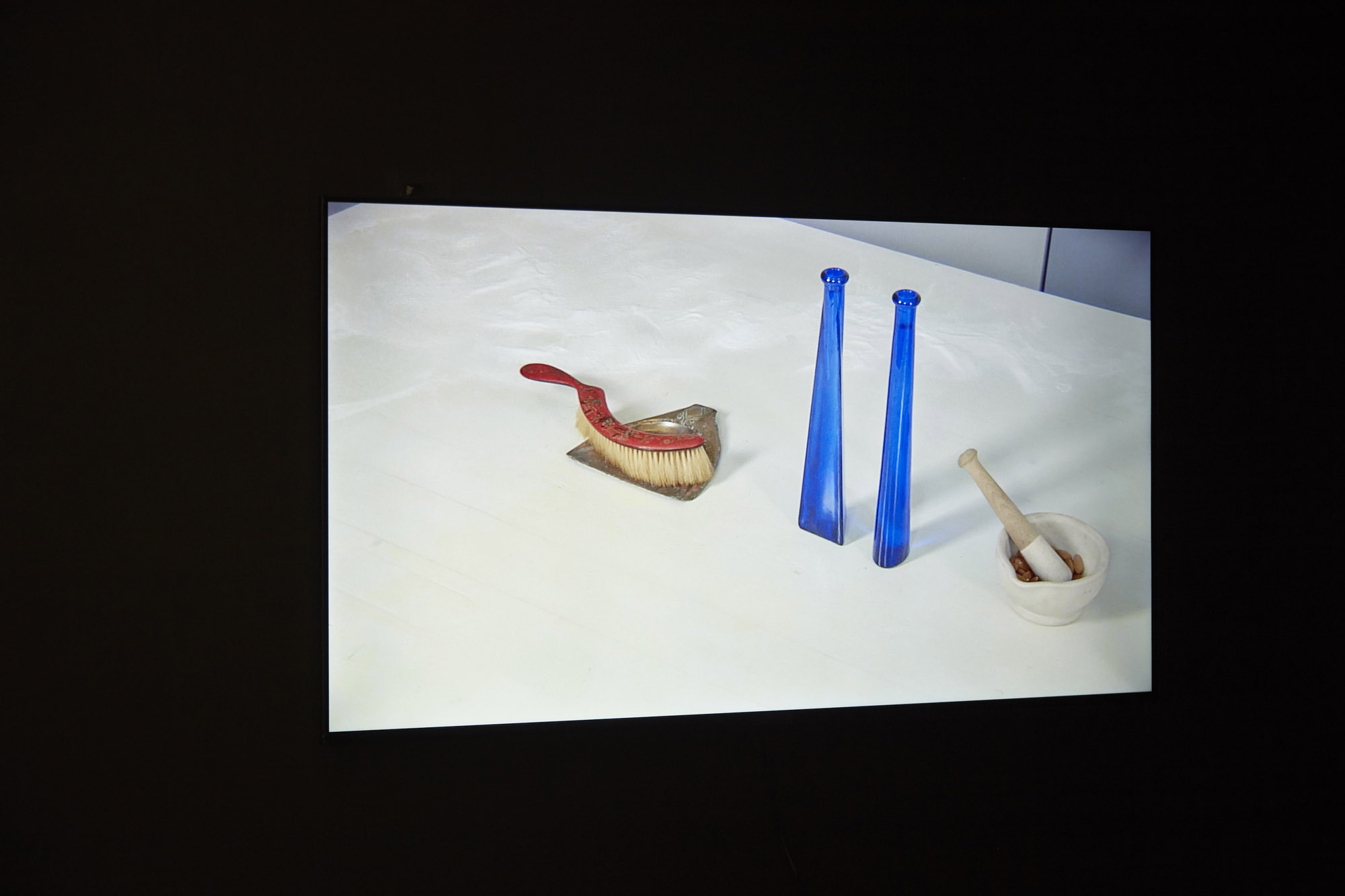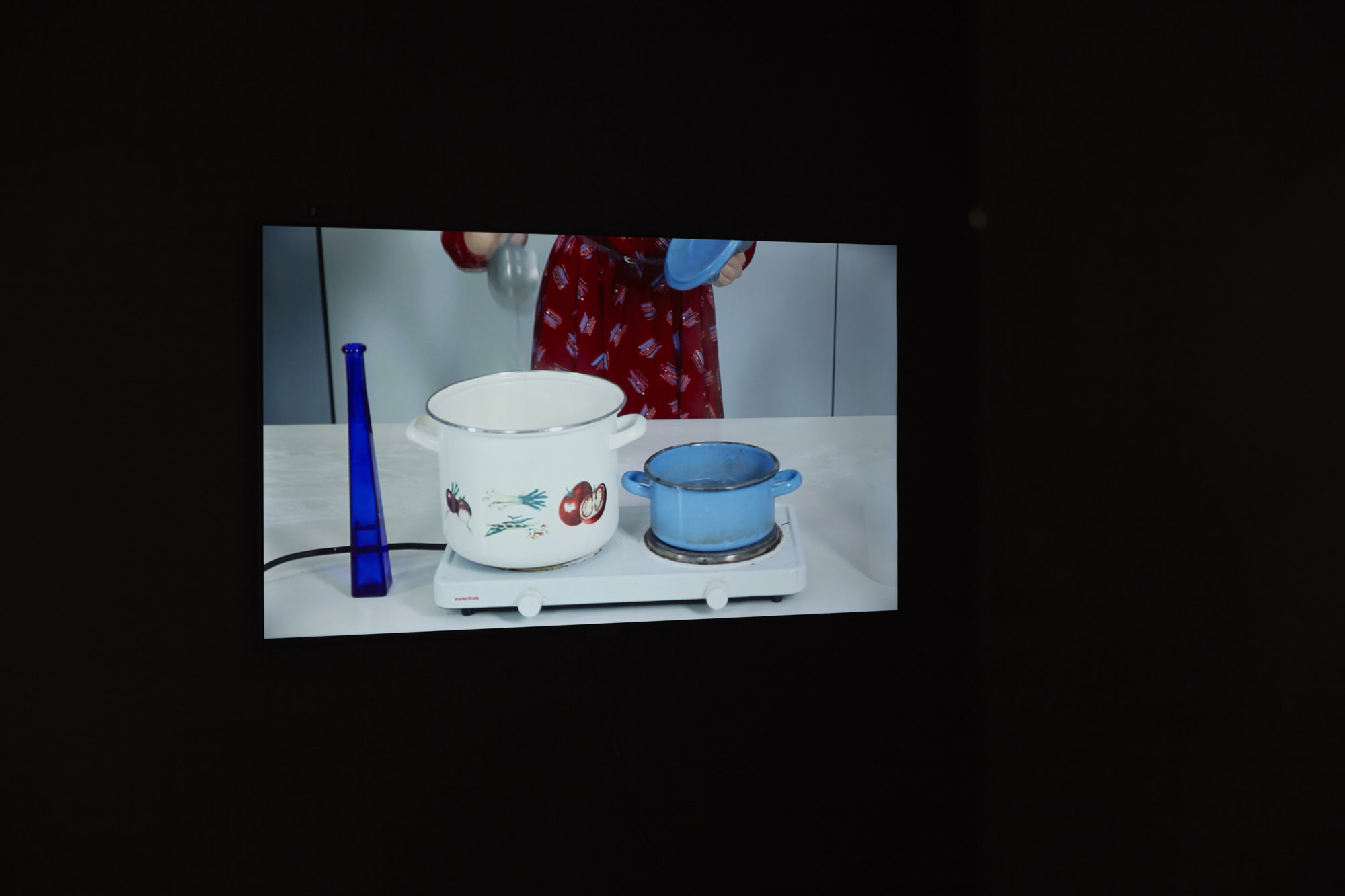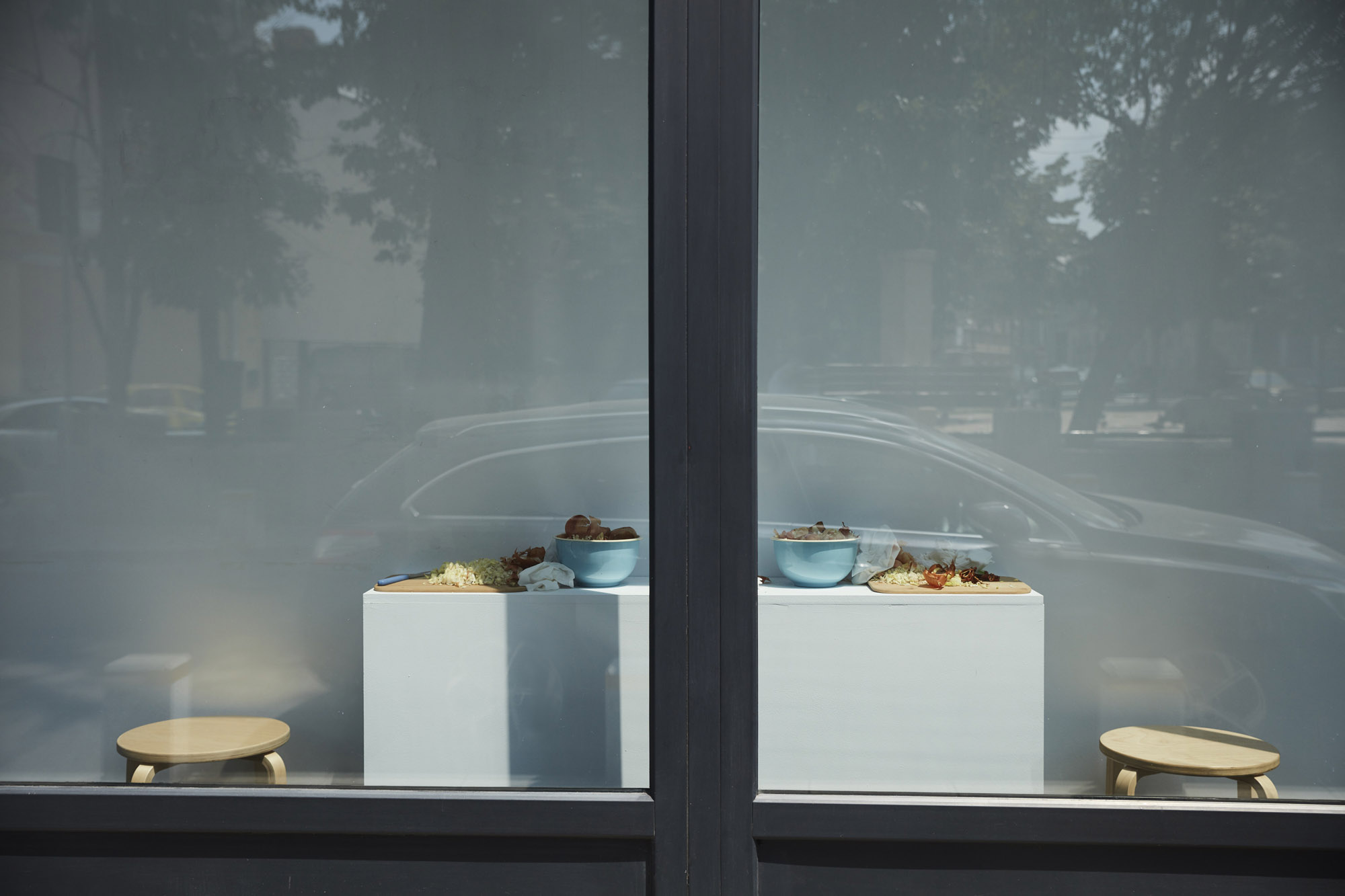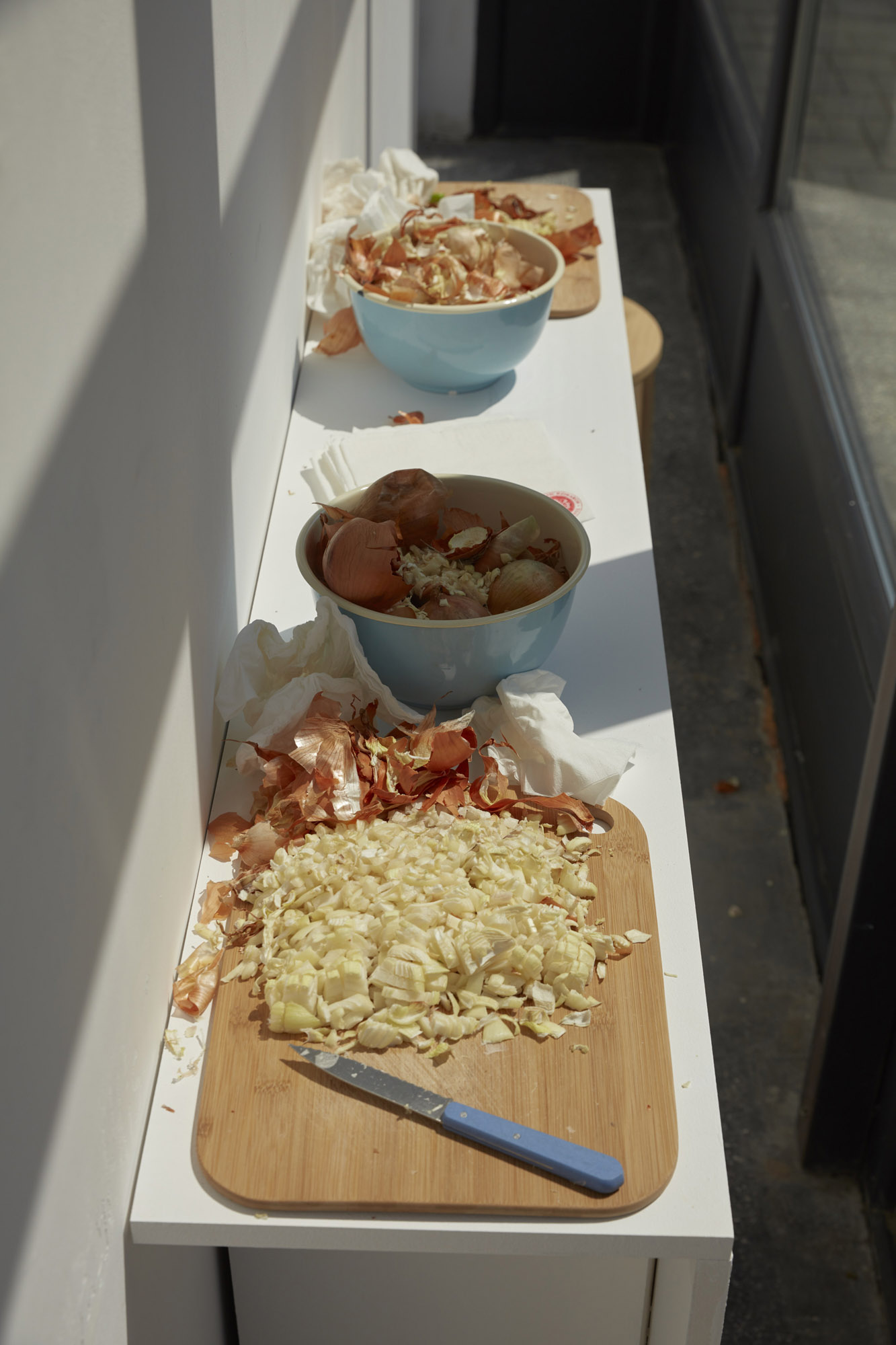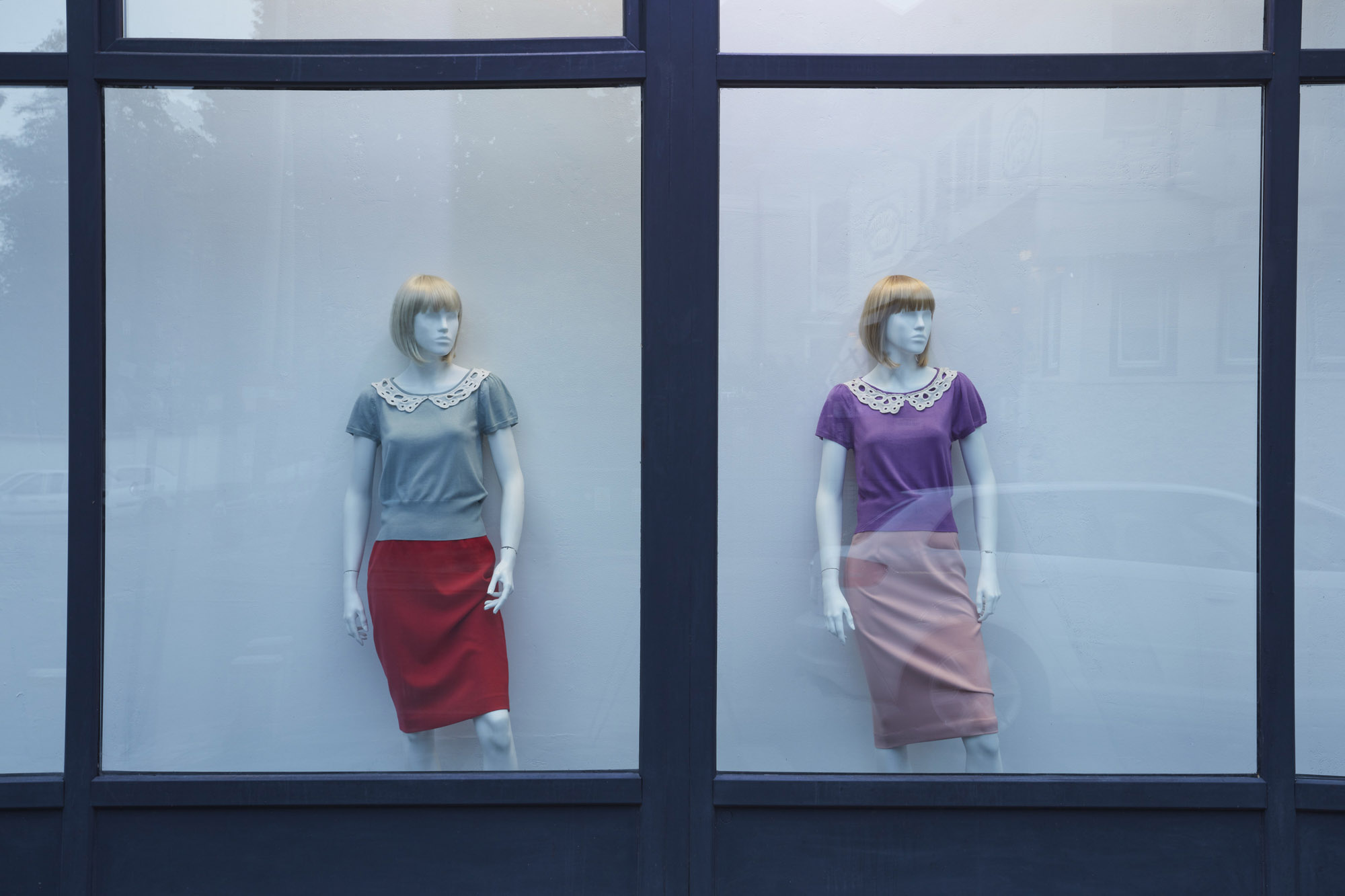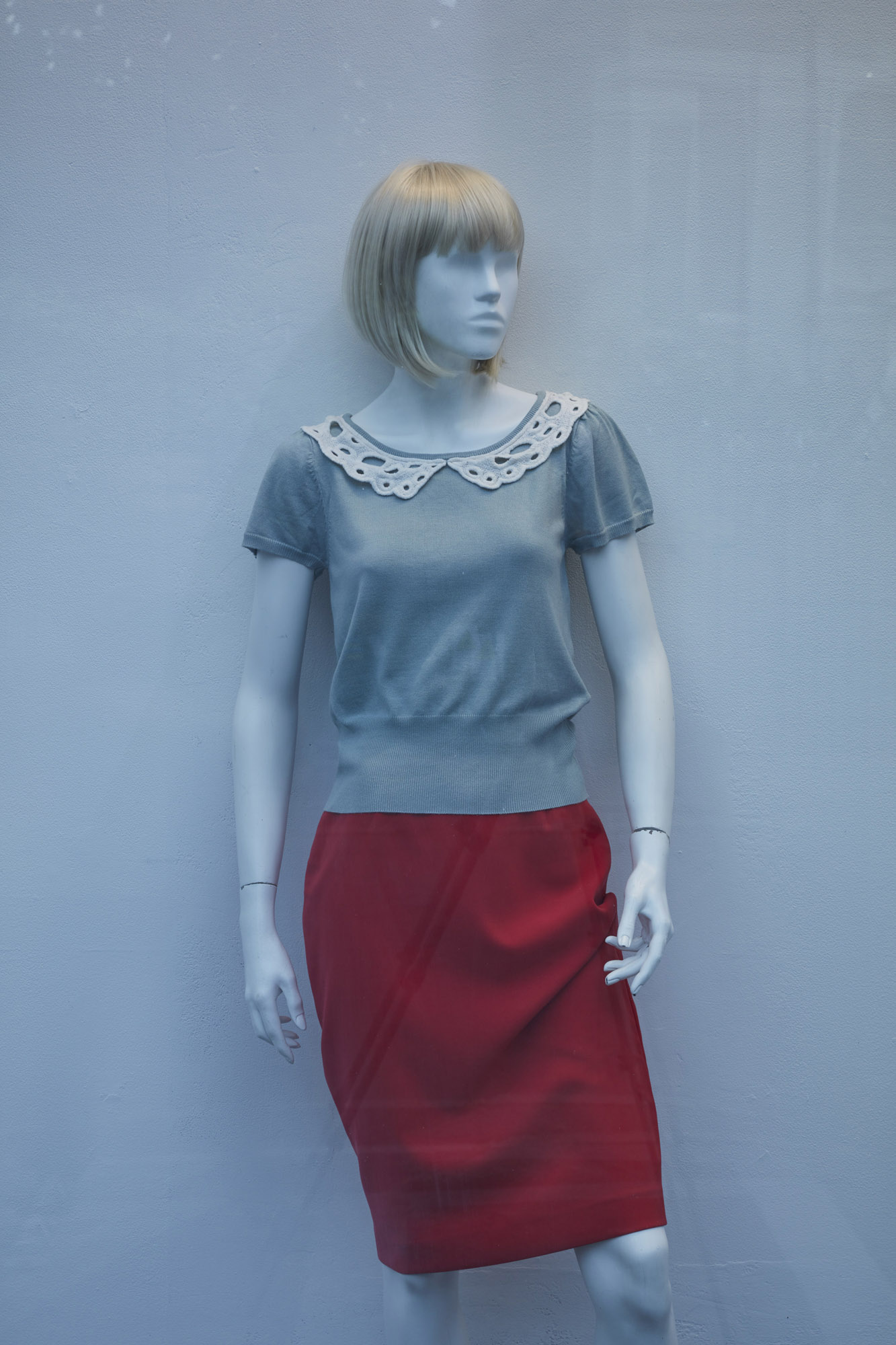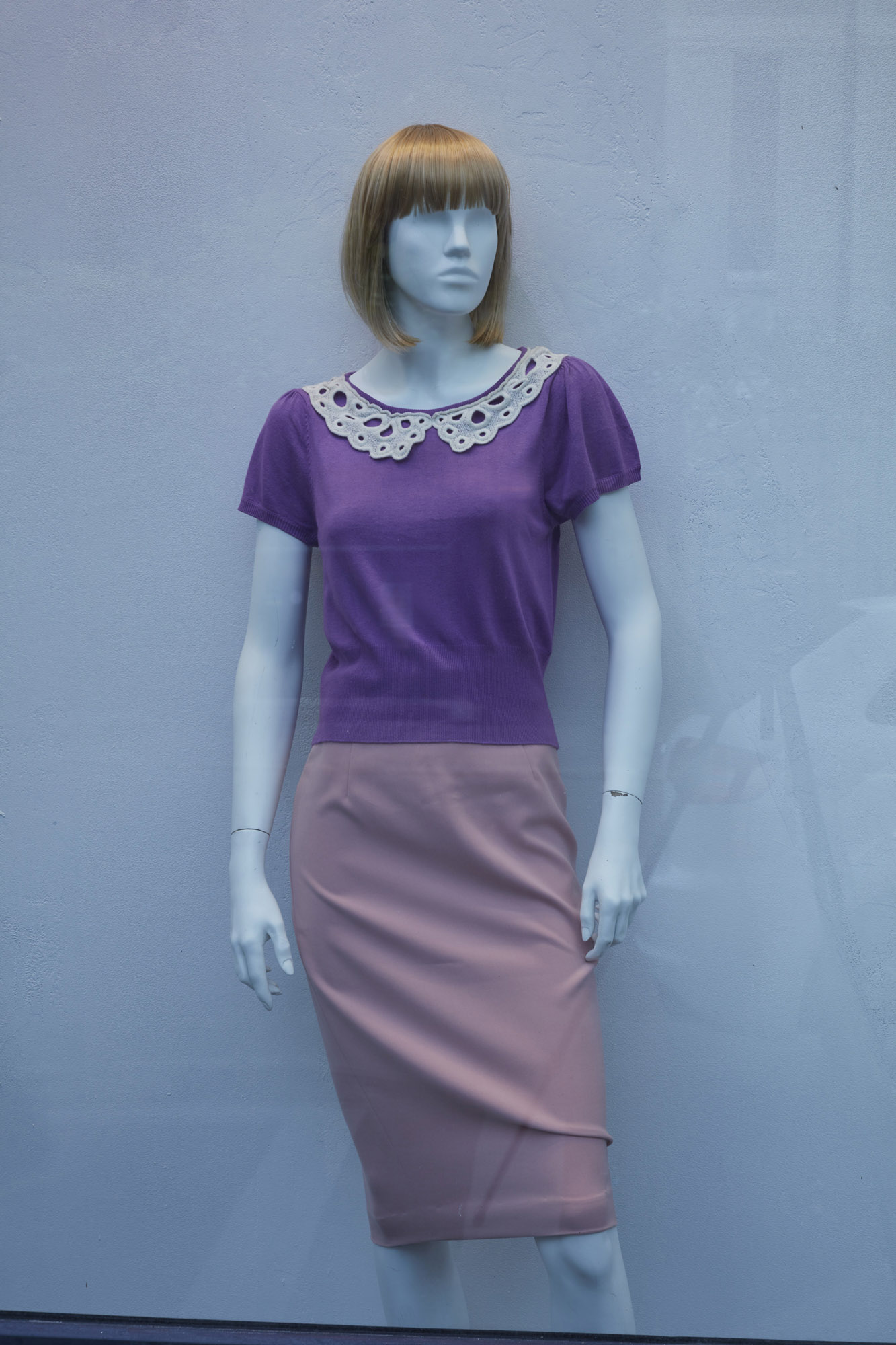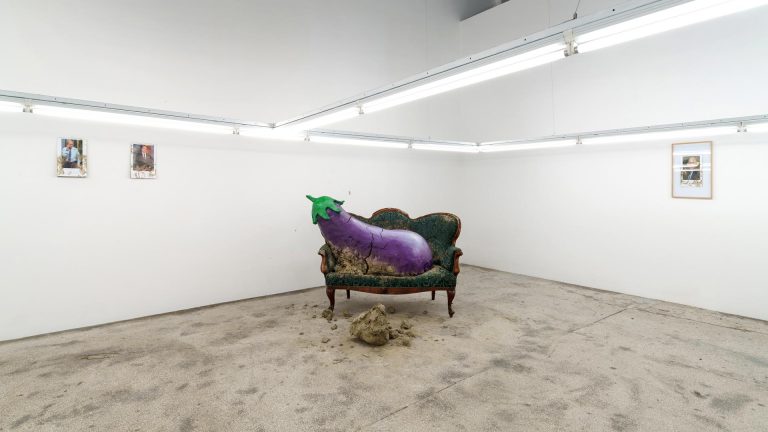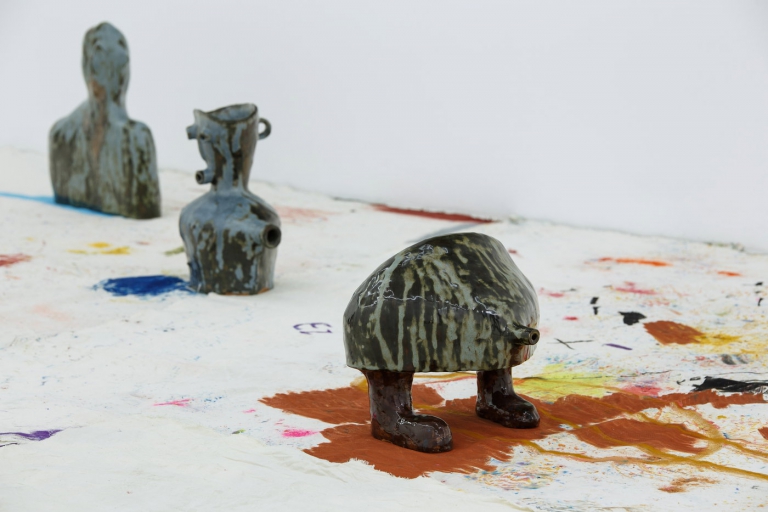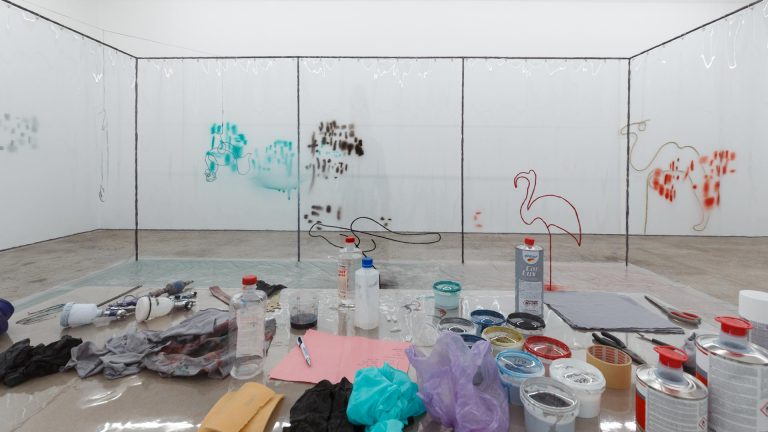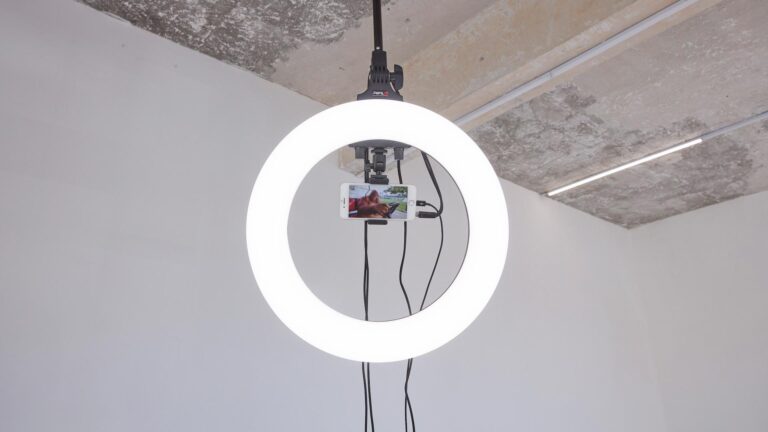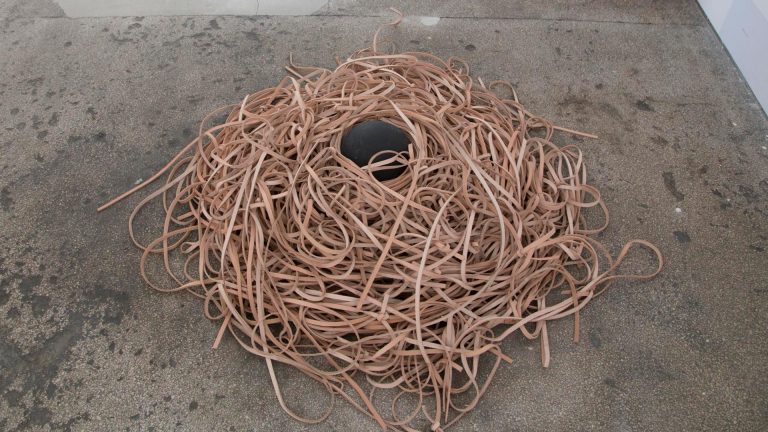Artists: The Bureau of Melodramatic Research
Exhibition title: Heartbeat Detection Systems
Venue: Suprainfinit, Bucharest, Romania
Date: June 30 – August 30, 2022
Photography: New Folder Studio / Dan Vezentan, all images copyright and courtesy of the artist and Suprainfinit, Bucharest
The Bureau of Melodramatic Research: HEARTBEAT DETECTION SYSTEMS
Spring 2010, the public space of Chișinău
Two ladies in their 20s, one colorfully dressed, the other in dark nuances, addressing the women passing by in front of important public institutions, such as The Stock Exchange, The National Commission for the Financial Market, The State University, etc, asking if they could measure their heels.
- “Write down please, 7cm high”
- “Mine is 10cm”, says Alina
- “Try measuring this other lady’s heels”
- “Ah, she gave me a strange look”
- “Leave it dear, maybe we can say that we started from the performance of gender and end up in a performance of institutions”, whispers Irina
- “While the financial situation is extremely uneven across the ex-soviet countries, the heels worn by women balances it all out”.
Wearing flat shoes, flimsy skirts and high socks, the two ladies were very serious about the collection of data on the height of the heels worn in the public space of Chisinau.
- “Darling, people are probably not aware of our future investigations in women’s crying and hysteria, techniques of self-care in the increasingly neoliberal societies, a new method of cooking with love and gold, the flame from Moreni – a petroleum explosion which could not be extinguished for three years, etc.”.
How could the half absence of an artistic practice still inform, expand and manifest itself within existing and potential future artworks?
How can the vital signs of a long term practice be detected and maintained and how can they incorporate the idea of absence?
Spring 2022, Bucharest, Atelierele Malmaison
Nine women are neatly lined up looking straight into the camera, with arms around the shoulders, high-heels on, sleek pencil skirts and matching colourful shirts, holding the exact same distance between their bodies, shoulders and feet, reaching the same height with the help of the high heels they wear. Precision is an important factor for The Bureau’s investigations. The nine women are part of the same generation and dear friends of Irina and Alina. This time they gaze into the camera without being the subject or extension of the male gaze, and thus subvert the woman-object patriarchal narrative. High Heel Communism is the newly commissioned, large-scale photograph which materializes one of Alina Popa’s last wishes, but which also marks the focus of this exhibition, together with another constellation of existing artworks. In 2019, a last photograph of the two artists together, as The Bureau of Melodramatic Research, was taken and that became the starting point behind High Heel Communism. Dressed in black and standing next to each other, reaching the same height due to the different dimensions of the heels the two were wearing in that specific moment, Irina and Alina look at the camera dissolving that feminine mystery.
Alongside the two photographs, the high heels from the tryptic are exhibited in a monumental form, thus elevating and celebrating stiletto shoes, a symbol of both femininity and sexism, to the level of art objects. To balance the ‘50s bourgeois aesthetic, a small photo part of Gross National Heel (2010), a performance undertaken in Chișinău, is subtly disclosed next to the plinth with the nine pairs of stilettos. All these elements highlight one of the multiple stakes of the Bureau, namely the creation of a complex instrument that belongs to the production of stereotyped images of femininity and which allows a framework for reflection and critique on broader socio-political issues.
The passivity of women to-be-looked-at and the type of domestic (emotional) labor that was unquestionably assigned to them for decades continues to be contested by The Bureau’s practice. Lovegold: A Cosmic Cooking Show (2014) is a performance and video work that presents an instructional show in which the simple domestic activity of cooking expands to a cosmic dimension. Presenting the preparation of food as a form of alchemy, they weave together the immateriality of love and materiality of gold, topped up by philosophical insertions on materialism and idealism, mystery techniques as a model for new economic exchanges. We never know if we are weeping or sweeping; Love is the new gold; The alchemical imperative of capitalism; Capitalism as commodity animism; Gold mining melts ecosystems; Love mining exhausts affective powers (BMR, Lovegold video work) – rap the two performers on stage while cooking an abstract dish. Their specific way of cooking leads to a deconstructed debate that is injected with the local socio-political situation happening at the same time, namely the long-term protests against cyanide mining for gold in Roșia Montană, a mountain region in Romania.
How can you incorporate your emotions in the food you are preparing everyday*? Or in the onion you are chopping? The Cry-Baby guide contains a set of instructions on how to use onion to control one’s display of emotions in the public space. In contrast to how men were viewed as masters of rationality and fully in control of their emotions, women were always associated with emotions, passivity, and the labor around the domestic environment. Surrounded by the neoliberalism’s catch on emotions and compassion as manipulative tools fostered by economic interests, the cry-baby is more and more often placed in an active role, either as an individual or as a collective, shedding political tears in the public space, a figure molding public opinion and depending on it at the same time (BMR, Cry-Baby guide). Set in the vitrine of Suprainfinit gallery as a performance at the opening and installation throughout the exhibition period, Cry-Baby: How to Win Hearts and Influence People (2010) was initially planned to be performed for the first time by two other artists, Silvia Costin and Mădălina Dan. How melodrama always has a contingent side, unexpected circumstances have determined Irina to perform instead. Even more so now, it reinstates the idea of melodrama as an emotional manifestation in the public sphere and as a form of resistance. In fact, this guide was amongst the first artworks that The Bureau conceived and that set melodrama as a working method, proposing a new etiquette of tears for socially forbidden outbursts (BMR, Cry-Baby guide).
White and grey gloves, white lace collars, strong nuances of red and purple, vintage hairstyles and red lipstick, Irina and Alina drive an American old timer against the backdrop of Ploiești, a Romanian industrial city, which is also the city they grew up in. Above the Weather (2015) is a video work that sets the premises of an ecological catastrophe, nurtured by the song which ends the film, Ajda Pekkan’s iconic love declaration to petrol from the 1980 Eurovision Song Context. In the smaller vitrine of the gallery, two mannequins display the performing costumes of the two artists. Retaining the memory of Alina and Irina sitting in the car and and sharing a bleak weather and ecological report from the future, the two costumes are still animated by a sense of collective affect, a becoming-woman-together (Rosi Braidotti), which is an essential part for feminism.
Heartbeat Detection Systems marks the first retrospective exhibition of The Bureau of Melodramatic Research, a dependent institution founded in 2009 by Irina Gheorghe and Alina Popa to investigate the role of emotions in contemporary politics and the new economy. Pulling together artworks that stir the future, present and past, the current exhibition infuses a sense of double-gaze: on one hand, a retrospective moment, in which some of the works already produced are reevaluated and presented to the public in a new context, and on the other hand, a moment of anticipation that pushes for reflections on the possibility of a further expansion of The Bureau’s practice, while accounting for an inevitable absence at its core.
Touch, absence and melodrama blend each other in the exhibition and form a metalanguage that is strongly visible in the practice of The Bureau of Melodramatic Research.
-Curatorial text by Cristina Vasilescu
The Bureau of Melodramatic Research, Heartbeat Detection Systems, 2022, installation view, Suprainfinit gallery, Bucharest
The Bureau of Melodramatic Research, Heartbeat Detection Systems, 2022, installation view, Suprainfinit gallery, Bucharest
The Bureau of Melodramatic Research, Heartbeat Detection Systems, 2022, installation view, Suprainfinit gallery, Bucharest
The Bureau of Melodramatic Research, High Heel Communism (tryptic), 2022, inkjet print on Hahnemühle paper, framed, 450 x 200 x 7 cm
The Bureau of Melodramatic Research, High Heel Communism (installation), 2022, 9 pairs of high-heel shoes, 400 x 40 x 110 cm
The Bureau of Melodramatic Research, The Last Photograph (High Heel Communism), 2022, inkjet print on Hahnemühle paper, framed, 100 x 100 cm
The Bureau of Melodramatic Research, High Heel Communism & Gross National Heel, 2022, installation view, Suprainfinit gallery, Bucharest
The Bureau of Melodramatic Research, Gross National Heel, 2010, inkjet print on Hahnemühle paper, 24 x 30 cm
The Bureau of Melodramatic Research, Cry-Baby: How to Win Hearts and Influence People, 2022, Cry-Baby guide, risograph print, edition of 250, 13 x 18.5 cm
The Bureau of Melodramatic Research, Cry-Baby: How to Win Hearts and Influence People, 2010, Cry-Baby guide excerpts
The Bureau of Melodramatic Research, Lovegold: a Cosmic Cooking Show, 2014, video stills in exhibition view
The Bureau of Melodramatic Research, Lovegold: a Cosmic Cooking Show, 2014, video stills in exhibition view
The Bureau of Melodramatic Research, Lovegold: a Cosmic Cooking Show, 2014, video stills in exhibition view
The Bureau of Melodramatic Research, Cry-Baby: How to Win Hearts and Influence People, 2022, performance installation in the vitrine of SUPRAINFINIT gallery (the performance was enacted at the exhibition opening by Irina Gheorghe and Madalina Dan)
The Bureau of Melodramatic Research, Cry-Baby: How to Win Hearts and Influence People, 2022, performance installation in the vitrine of SUPRAINFINIT gallery (the performance was enacted at the exhibition opening by Irina Gheorghe and Madalina Dan)
SEQUENCE #10: The Bureau of Melodramatic Research – Above the Weather, 2015, installation with the costumes worn during their performance Written on the Wind presented as part of the Art Encounters biennial in Timisoara, 2015
SEQUENCE #10: The Bureau of Melodramatic Research – Above the Weather, 2015, installation with the costumes worn during their performance Written on the Wind presented as part of the Art Encounters biennial in Timisoara, 2015
SEQUENCE #10: The Bureau of Melodramatic Research – Above the Weather, 2015, installation with the costumes worn during their performance Written on the Wind presented as part of the Art Encounters biennial in Timisoara, 2015

